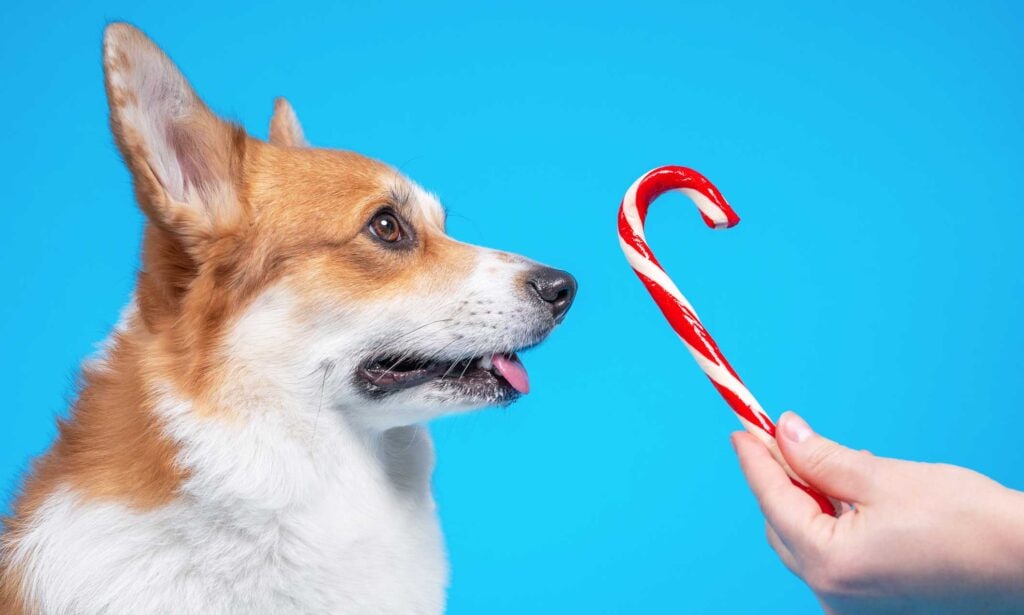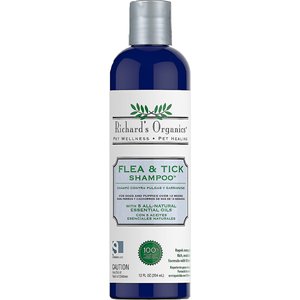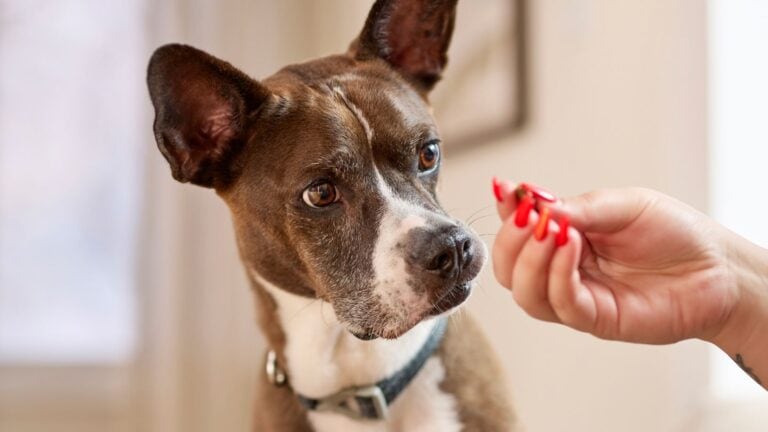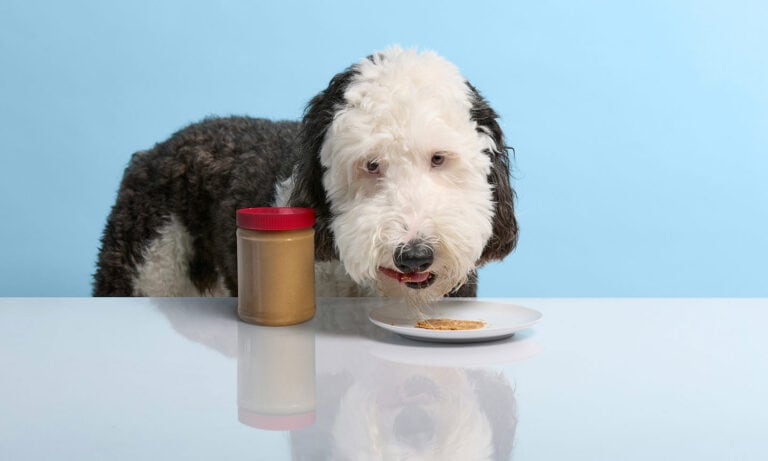Peppermint is known for its cool, refreshing taste and is used in a variety of products, including teas, candies, toothpaste and essential oils. Its widespread use means a curious pooch could get their paws on it. But can dogs have peppermint?
The answer depends on the form of peppermint and the amount consumed. For instance, very small amounts of peppermint leaves are generally safe for dogs to consume, while peppermint candies should be kept off the doggy menu entirely.
We spoke with a vet expert to get the 411 on the safety and risks of giving dogs peppermint.
4 Types of Peppermint and If They’re Safe for Dogs
Let’s break down the different types of peppermint and their safety for your four-legged buddy.
1. Fresh Mint Leaves
Fresh peppermint leaves are generally safe for dogs to eat in very small amounts—we’re talking an occasional leaf or two.
Some pet parents vouch for giving peppermint leaves to dogs to freshen their breath and provide digestive support. However, it’s best to avoid giving them peppermint leaves for these purposes. Why? Because it’s easy to inadvertently give them too much, which can cause irritation of the mouth and gastrointestinal upset such as vomiting and diarrhea.
What about other types of mint leaves? Let’s review these as well:
- Spearmint: Spearmint (aka garden mint) is the type of mint that’s most commonly found in grocery stores. Like fresh peppermint leaves, fresh spearmint is generally safe for dogs in very small amounts (an occasional 1-2 leaves). Consuming too much could cause gastrointestinal upset, resulting in vomiting or diarrhea.
- Wintergreen: Wintergreen—which is often marketed as a form of mint, though it actually isn’t mint—is toxic to dogs and should be avoided in all its forms (leaves, oil, gum, candy, etc.). It contains an aspirin-like chemical called methyl salicylate that can cause a host of problems in dogs, ranging from vomiting and confusion to kidney issues and liver failure.
- Pennyroyal: This mint’s oil contains a volatile chemical called pulegone, which can cause vomiting, diarrhea and serious liver damage in dogs. Pennyroyal should be avoided in all its forms, as it is highly toxic to your pup.
2. Peppermint Candy
Keep these out of your pup’s reach!
- Peppermint hard candies (including candy canes), chewing gums and breath mints: These often contain xylitol, a sugar substitute that’s extremely toxic to dogs. Even small quantities of xylitol can cause a rapid release of insulin, resulting in hypoglycemia (low blood sugar). Untreated hypoglycemia can lead to seizures and coma. In certain cases, ingestion of xylitol by dogs can also result in acute liver damage.
- Peppermint chocolates: Sorry, doggos; these are off limits, too. Chocolate is also toxic to canines due to two of its components—caffeine and theobromine—which affect a dog’s cardiovascular and neurological functions. This can cause restlessness, increased thirst, increased urination, abnormal heart rhythm, muscle tremors and seizures. In severe cases, it can even lead to death.
- Peppermint candies and gums: These usually come in some combination of plastic, foil or paper wrappers, which, if ingested, can cause a life-threatening intestinal blockage.
3. Peppermint Essential Oil
Peppermint essential oil (sometimes called peppermint oil) is the pure, concentrated oil that’s extracted directly from the peppermint plant (Mentha x piperita) through steam distillation. It’s extremely potent and contains high concentrations of active compounds, such as menthol and menthone.
In humans, peppermint essential oil can be used in various ways, but are these methods safe for dogs? Let’s review:
Internally
You should never allow your dog to consume peppermint essential oil sold for human use, as this concentrated oil can be harmful and even toxic for dogs. Some symptoms of peppermint oil ingestion may include:
- Drooling
- Vomiting
- Diarrhea
In severe cases, ingestion can cause seizures and liver failure.
Inhalation
While we humans might enjoy the aroma of peppermint that emanates from diffusing the oil in an aromatherapy diffuser, subjecting your dog to this mist can be harmful.
In addition to releasing aromas, these diffusers disperse fine particles of oil into the air. If your dog inhales enough of these particles, they could experience adverse reactions like wheezing, coughing or breathing difficulties, particularly if they have asthma.
Also, these droplets can settle on your dog’s fur, potentially leading to ingestion while they groom themselves. Given the potency of essential oils, ingesting even a small quantity could result in adverse effects or toxicity.
Learn more about dogs and essential oil diffusers.
Topically
You may have heard that peppermint oil can help repel and kill fleas and ticks on dogs. While some evidence suggests that peppermint oil (in amounts unsafe and toxic for dogs) might have these properties, comprehensive research about its efficacy for getting rid of fleas is lacking. Regardless, you should never apply peppermint oil directly to your dog’s skin or coat, as the high menthol content can be very irritating to the skin and mucous membranes.
Additionally, applying peppermint oil to your dog’s skin allows it to enter their bloodstream and increases the risk of ingestion through grooming, which can cause toxicity.
If you’re interested in taking a natural route to pest protection, there are dog-safe products available, such as Richard’s Organics Flea & Tick Shampoo, that contain small amounts of peppermint oil and other essential oils. Or if you want a sure-fire flea and tick killer, go with options such as Frontline Plus or K9 Advantix II. Of course, always check with your vet before using new products on your dog.
Learn more about how to safely get rid of fleas on your dog and in your house.
Supplements and Dental Products
Some dog supplements and products contain very small amounts (usually around 0.1 percent) of dog-friendly and food-safe peppermint oil. These products typically incorporate peppermint oil to help freshen breath or mask the smell of a stinky ingredient such as fish oil.
The carefully controlled levels of peppermint oil in such products are generally considered safe for dogs, as long as you adhere to the product’s serving recommendations.
Here are a few products for dogs that include peppermint oil. (Check with your vet before giving to your dog.)
4. Peppermint Tea
While dogs can occasionally have small amounts of plain, caffeine-free peppermint tea (about 1/4 to 1/2 cup, depending on the dog’s size), fresh water should always be the first beverage of choice for your pup.
As with fresh leaves, some people claim that peppermint tea helps soothe their dogs’ digestive woes, but peppermint tea should not be the first line of defense for an upset stomach. Instead, if your dog’s stomach is upset, feed them a bland diet consisting of easy-to-digest foods like chicken, rice and pumpkin for a couple of days. If this doesn’t alleviate the problem, a visit to your veterinarian is in order.
What To Do if Your Dog Consumes Peppermint or Other Types of Mint
The seriousness of peppermint consumption depends on the form your dog consumed and how much they consumed.
If your dog ingested large amounts of fresh peppermint or spearmint, seek advice from your veterinarian or an animal poison helpline, such as:
- The ASPCA’s Animal Poison Control Center (APCC) at (888) 426-4435
- The Pet Poison Helpline at 855-764-7661
You should immediately take your dog to a veterinarian or pet emergency clinic if they:
- Consumed any form of wintergreen
- Consumed peppermint candy containing xylitol
- Consumed a substantial amount of chocolate (more than 1.5 ounces of dark chocolate per 10 pounds of body weight or 3.5 ounces of milk chocolate or semi-sweet chocolate per 10 pounds of body weight)
- Consumed peppermint essential oil (with the exception being if the oil was included in a dog-friendly supplement or product and given as directed)
Foods dogs can eat:
Share:















